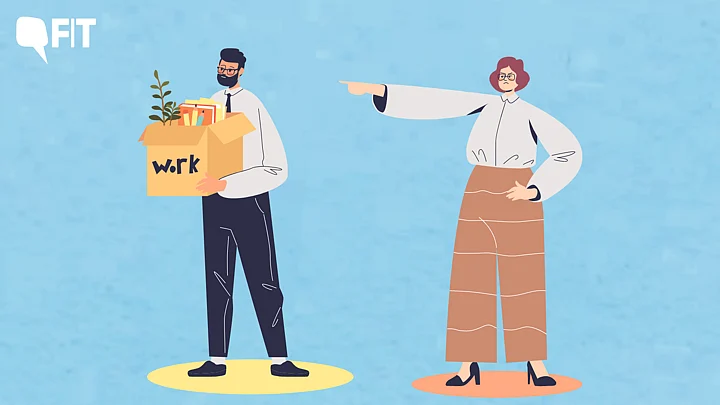Spotify lays off 10,000 employees.
18,000 laid off by Amazon.
Microsoft let go of 10,000 people.
Google terminates contracts of 12,000 workers.
These words splashed all over the internet in the last few weeks are enough to strike panic in anyone working in the formal sector, let alone the tech bros.
With a global recession likely looming over our heads, it’s but natural to feel scared of losing your job.
‘Layoffs Can Be Traumatic’
According to Dr Kamna Chhibber, Clinical Psychologist, Head, Department of Mental Health and Behavioural Sciences, Fortis Healthcare, layoffs can impact your well-being, your quality of life, and also the way you look at life.
"At least temporarily, or sometimes even permanently, layoffs can disrupt any future plans you might have had, especially ambitions or goals related to your career, and bring in a sense of unpredictability about life in general."Dr Kamna Chhibber
A feeling of helplessness, and not knowing how to deal with the situation might cause more stress.
Being a psycho-social stressor, a sudden event like a layoff might even trigger an anxiety disorder, depression, or insomnia, while also making you restless, irritable, upset, and sometimes angry. It can also impact your sleep and diet, which can further worsen your mental health.
Dr Ekta Soni Puri, Senior Consultant, Mental Health & Psychiatry, Indraprastha Apollo Hospitals, New Delhi, also feels that uncertainty, self-doubt, lowered self-confidence, and the breakdown of people’s decision-making capacity in a situation like this can cause Post Traumatic Stress Disorder (PTSD) in the long run.
"Thoughts like ‘What if this happens again?’, ‘Was I not good enough?’, ‘Was it my personal failure?’, or ‘What next now?’ might haunt people the next time they go for an interview."Dr Ekta Soni Puri, Senior Consultant, Mental Health & Psychiatry, Indraprastha Apollo Hospitals, New Delhi
A study titled The Great Recession and Mental Health in the United States also said, "For individuals each recession impact experienced was associated with long-lasting and transdiagnostic declines in mental health."
Traumatic Even For Those Retained
Surprisingly, or not, layoffs can be anxiety-inducing even for people who've been retained by organisations during mass layoffs. This might be due to the fear that you’re next, or raise a question about your future in the company as an individual.
Akansha (name changed), who works in the media industry, confesses that when her company laid off a bunch of people, it lead to innumerable sleepless nights for her.
With the current news of layoffs and recession, her work-life balance has gone for a toss again, with added stress, uncertainty, self-doubt, and anxiety for her.
"The dreaded question – ‘Am I going to be the next one?' – has made a comeback. Overtimes and cancelled leaves are the new normal at my workplace," she says.
The stress might be more if the company enforces cold-cut layoffs with no prior communication.
In scenarios like this, Dr Puri says that the retained employees often overdo things, stay in the office beyond duty hours, and overcompensate just to ensure some sense of job security.
In fact, a study, titled Lay-offs and the Mental Health of Remaining Workers in Pandemic COVID-19, published in the International Sustainable Competitiveness Advantage Journal said,
"The remaining employees, from the mass layoffs had a significant negative effect on their mental health. The negative effects of psychological impacts over time can translate into physical health problems. Sullivan and Von Watcher (2006) suggest that the death rate appears to have increased markedly in the years following mass layoffs."Study authors
Transparency and Open Communication: How Organisations Can Make Layoffs Less Stressful
Innately tough news like layoffs can be less stressful for employees when organisations actually communicate the same to them. Dr Chhibber suggests some things that, layoffs or not, organisations should be mindful of.
Maintaining transparency and communicating with the people who are being laid off, and those continuing in the organisation about what is happening.
This is necessary to rebuild their trust in their workplace and make sure that their will to be productive for the organisation is not lost.
Having open channels for communication where people’s concerns are heard, their issues taken up on larger levels, and a space is provided for them to engage if they ever feel disconnected from the system.
Remind people of any employee assistance that they might get from the company and the resources they’ll be provided if they feel distressed.
‘Distance Your Self-Worth From The Layoff’
As hard as a lay-off might be, Dr Chhibber emphasises that the important thing to remember is that layoffs usually don’t have anything to do with a particular employee.
More often than not, they are the result of a larger transition that the organisation is undergoing which might be sometimes due to global events that are out of even their control. She suggests:
Having a realistic understanding of what your strengths are and leaning into your past achievements and accomplishments
Maintaining robust contact with your support system whom you can reach out to in times of need
Don't hesitate to seek help
On the other hand, according to Dr Puri, the person laid off should take some time to grieve, rant, cry, and be obsessive about it. But after that’s done, think of it as an opportunity to turn over a new leaf, learn, and grow their skill set.
She adds,
Try and believe that things will get better sooner than later
Remember that you are resilient and can overcome this
Measures like these become more important because the mental health of the Indian workforce is anyway not something to boast about. A survey done in 2020 by The7th Fold found that, thanks to COVID-19, 50 percent of the Indian workforce struggled with mental health issues.

